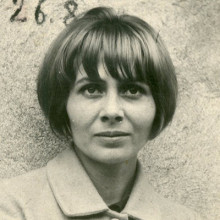Polish literature

Zyta Oryszyn
Born in 1940, she is a writer, journalist and translator.
Her work can be classed as psychological fiction, and focuses on the painful issues of post-war life in Poland (the effects of the war, being relocated, uprooted and persecuted, and the difficulties of the communist era), and for many years it was of only marginal interest to the reading public. One of the reasons for this state of affairs may be that in the 1980s Oryszyn gave up working with the official, state-approved publishing houses, and only let the independent, blacklisted ones publish her books. The situation did not improve when attempts were made to revive interest in her work by re-issuing Madame Frankenstein and Black Illumination in the Canon of Underground Literature series. As well as describing the destructive effect of the force of history on ordinary lives, Oryszyn’s novels combine action set in Lower Silesia, and characters who are “settlers” – they speak in various languages, come from various social spheres and have had various experiences. As they try to survive in a new location and under a new system, these “damaged people” to some extent renounce their identity. In Oryszyn’s work the leitmotif of the scar has considerable significance. Feeling emotionally lost, being incapable of cutting oneself off from the past, or needing to assume a new identity is the inevitable fate of many of those who survived the traumas of war. As Inga Iwasiów says: “Zyta Oryszyn seems to keep on telling the same story, adding further episodes to it and introducing new characters; she keeps moving backwards, never offering hope for a release from the confines of the original tale.” And this is true; Oryszyn’s writing is consistent, in terms of the issues it covers as well as its form. The publication in 2012 of Saving Atlantis came as a surprise, and was seen as Oryszyn’s emergence from the shadows and return to the literary stage. Her most uncompromising narrative, the book won the Gdynia Literary Prize and the Gryfia Literary Award for Women Authors. Developing some themes located between the outbreak of the Second World War and the martial law period, Oryszyn fills in some of the details of her main characters’ biographies that had been left a mystery in her earlier books. The story told in Saving Atlantis starts in eastern Subcarpathia, where a Polish family is hiding in a shelter dug out of the ground, while the war rages in the background. When it finally ends, the family moves to Leśny Brzeg on the River Oder (Lower Silesia) and settles in a tenement that used to be German. But the post-war era brings new dramas; the Stalin era in Poland is a time of mutual mistrust and denunciations, as loved ones disappear in mysterious circumstances. What’s more, the family’s new place of residence is marked by the harm inflicted by its former inhabitants. But Saving Atlantis should not be regarded as yet another record of the nightmare of living through the war and the Nazi occupation, or as testimony to the horror of life in communist Poland. Instead Oryszyn demonstrates that even when the historical circumstances are so unfavourable that life, like Atlantis, should sink without a trace, against all the odds, it continues.
BIBLIOGRAPHY
- Najada [The Naiad], Warsaw 1970.
- Melodramat [Melodrama], Warsaw 1971.
- Gaba-Gaba czyli 28 części wielkiego okrętu 1972 [Gaba-Gaba, or 28 Pieces of a Great Big Ship], 1972.
- Czarna iluminacja [Black Illumination], Wydawnictwo NOWA, 1981.
- Madam Frankensztajn [Madame Frankenstein], Wydawnictwo Przedświt, 1984.
- Historia choroby, historia żałoby [A History of Illness, a History of Mourning], “PoMost”, 1990.
- Ocalenie Atlantydy [Saving Atlantis], Warsaw: Świat Książki, 2012.